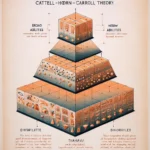**Cattell-Horn-Carroll (CHC) Theory: A Comprehensive Guide for Cognitive Testing**
—
The **Cattell-Horn-Carroll (CHC) Theory** is a widely recognized psychological framework that plays a crucial role in modern cognitive testing and assessment. This theory represents the synthesis of the work of three eminent psychologists: Raymond B. Cattell, John L. Horn, and John B. Carroll. It offers an exhaustive classification of cognitive abilities that has been influential in both educational and psychological contexts.
**Origin and Development**
Originally, Raymond Cattell proposed the concept of fluid and crystallized intelligence. Fluid intelligence is the capacity to solve novel problems without relying on previous knowledge, whereas crystallized intelligence involves using knowledge gained through past learning and experience. John Horn further elaborated on these concepts, and together Cattell and Horn developed the Gf-Gc theory.
Building upon this foundation, John B. Carroll later introduced the Three-Stratum Model, which organized cognitive abilities into a three-tiered hierarchy. The integration of these models gave rise to the comprehensive CHC Theory, offering a detailed architecture of cognitive processes.
**Stratum III (General Intelligence)**
At the apex of Carroll’s model lies general intelligence (g), representing the broadest level of cognitive ability that influences a range of mental processes.
**Stratum II (Broad Abilities)**
Below general intelligence, there are broad abilities that include fluid intelligence (Gf), crystallized intelligence (Gc), and other factors such as general memory and learning (Gy), broad visual perception (Gv), broad auditory perception (Ga), and processing speed (Gs).
**Stratum I (Narrow Abilities)**
At the base of the hierarchy, these broad abilities are further divided into more specific, narrow abilities. For example, fluid intelligence encompasses inductive and deductive reasoning, while crystallized intelligence includes language comprehension and knowledge application.
**Applications in Cognitive Testing**
The CHC Theory provides a comprehensive framework for cognitive assessments and intelligence testing. Its detailed categorization of mental abilities informs the design of educational evaluations, neuropsychological assessments, and intellectual measures. Tests influenced by the CHC Theory include the Woodcock-Johnson Tests of Cognitive Abilities, as well as curriculum-based measurement tools and specialized diagnostic assessments.
**Utility in Education and Psychology**
In educational settings, the CHC Theory is employed to identify student learning strengths and weaknesses, informing tailored educational programs and interventions. Psychologists rely on the CHC framework to diagnose cognitive deficits and develop personalized treatment plans, particularly for individuals with learning disabilities or neurological disorders.
**Ongoing Research and Evolution**
The CHC Theory continues to evolve as new research reveals more about cognitive abilities. Experts frequently reevaluate and expand the theory, ensuring its relevance and accuracy in capturing the complex nature of human intelligence.
In summary, the Cattell-Horn-Carroll Theory represents a robust, multidimensional view of intelligence that has a profound impact on the field of cognitive testing. It provides a structured approach for understanding cognitive strengths and challenges, crucial for educational planning, psychological assessment, and research into the vast intricacies of the human mind.

